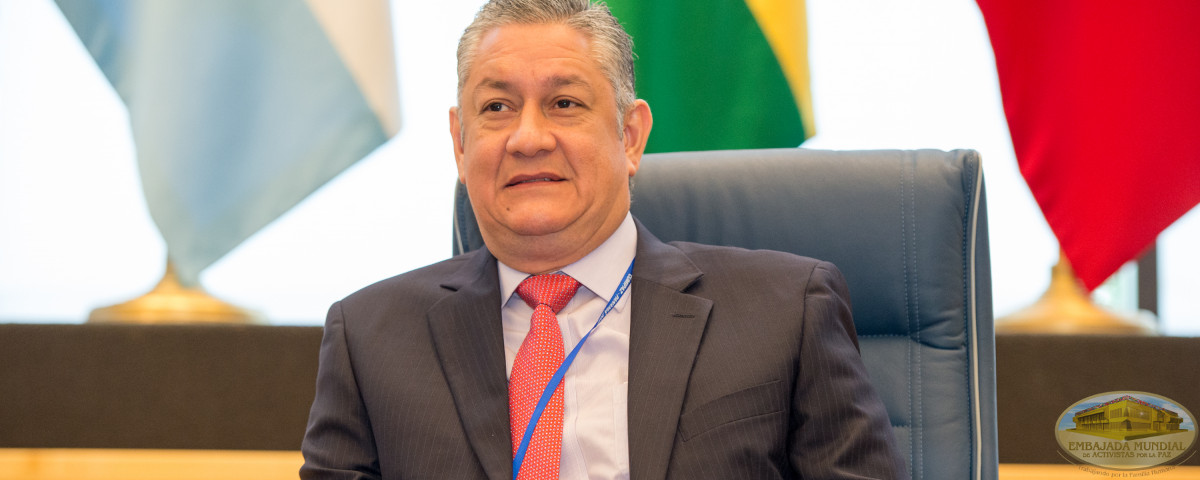
Luis Eduardo Quirós | Installation Act - Parliamentary Session, CUMIPAZ 2017
Good morning Gabriela Lara, general director of the Global Embassy of Activists for Peace; her excellency Yanibel Abrego Smith, President of the National Assembly of Panama; deputy Gabriel Soto, vice president of the National Assembly of Panama; Dr. James Matthew Lambert, Secretary of Hemispheric Affairs of the Organization of American States (OAS); Dr. Humberto Peláez, executive secretary of Parlatino; Mr. Eduardo González, director of this seat of the Latin American Parliament; national and international invited panelists; diplomatic corps accredited in Panama, government authorities.
I want to start by thanking the Peace Integration Summit, for having chosen the Latin American Parliament as the site to carry out this momentous meeting of leaders and thinkers who are faithfully committed to the rights of Mother Earth and world peace, as the most appropriate way to reach the great goals and challenges of humanity in this century.
For this reason, I give you the most jovial welcome to our country, which has been characterized, throughout its history, for its vocation of peace, unity, and harmony, with all the sister nations of the region and the rest of the world.
Within the framework of this event it is important to specify that the social responsibility and sustainability of our humanity depends initially on ourselves, especially on the social and governmental leaders of the nations, who through political or social power can orient the destiny of our peoples in a way.
Sustainable development, as it has been manifested in different world forums, must be understood as the satisfaction of the needs of the present without compromising the capacity of future generations. Therefore, it can be considered as the most effective mechanism that can meet the demands and expectations of society as a whole.
In this regard, I would like to point out that the Latin American Parliament has promoted, in recent years, normative actions of sustainable development in our nations, aimed at reconciling ourselves with the environment that, as we all know, has been severely affected by the indiscriminate felling of trees, the contamination of rivers and forests, as well as the excess of polluting gases in the atmosphere.
An example of the aforementioned was the holding of the Thirty-second General Assembly of Parlatino, held in December 2016, which was oriented towards the Sustainable Development Goals.
This Assembly included, in the area of peace and development and equity, high-level meetings related to drug prevention policies, security in the region, and the mobilization of parliaments against the discourse of non-hatred that must be translated into parliamentary harmony. It similarly reinforced on these issues concerning the strengthening of the quality of democracy and also of parliaments.
We must emphasize that in this Assembly, in addition to Latin American and Caribbean parliaments, international organizations and members of civil society participated, which constituted an effective space of unity, plurality, integration, and cooperation, in order to strengthen the pillars and principles that support the sustainable development of our peoples. In this direction, productive scenarios of peace, stability, consensus, and permanent dialogues in the region were achieved.
I take this opportunity to refer to an international standard, which we are beginning to make known in the National Assembly, thanks to the support of President Yanibel Abrego, which is known worldwide as ISO 26000; it has seven fundamental principles or subjects on social responsibility, which are oriented towards governance, human rights, labor practices, the environment, fair operating practices, consumer issues, active participation, and community development.
This ISO 26000 standard should serve as a guide for all public or private organizations that wish to draw up their action plans towards a better world led by sustainable development.
The Commission for Education, Culture, Science, Technology, and Communication of the Latin American and Caribbean Parliament, which I have the honor of presiding over, has been working in its last sessions on the education initiative for the culture of peace. This is a task that we have been working on together with professors of education for the culture of peace of UNESCO, who have pointed out the need for parliaments to have a common vision on the culture of peace and human rights. This UNESCO chair facilitates elements that help, with the purpose of generating public policies and legislations.
Finally, I hope that your stay in our country is most pleasant for all of you. We are very, very pleased to receive you in this Latin American legislative house, which is the home of all of you.
Receive a fraternal greeting from the president of the Latin American Parliament, Deputy Elías Castillo, who for personal inconveniences could not be with you this morning, but rest assured that he is very attentive to the development of this event.
I conclude with some motivating and reflective words of Pope Francis, in his recent visit to Colombia, when he said that: "The search for peace is always an open work, a task that does not give up, and demands the commitment of all."
Thank you very much.